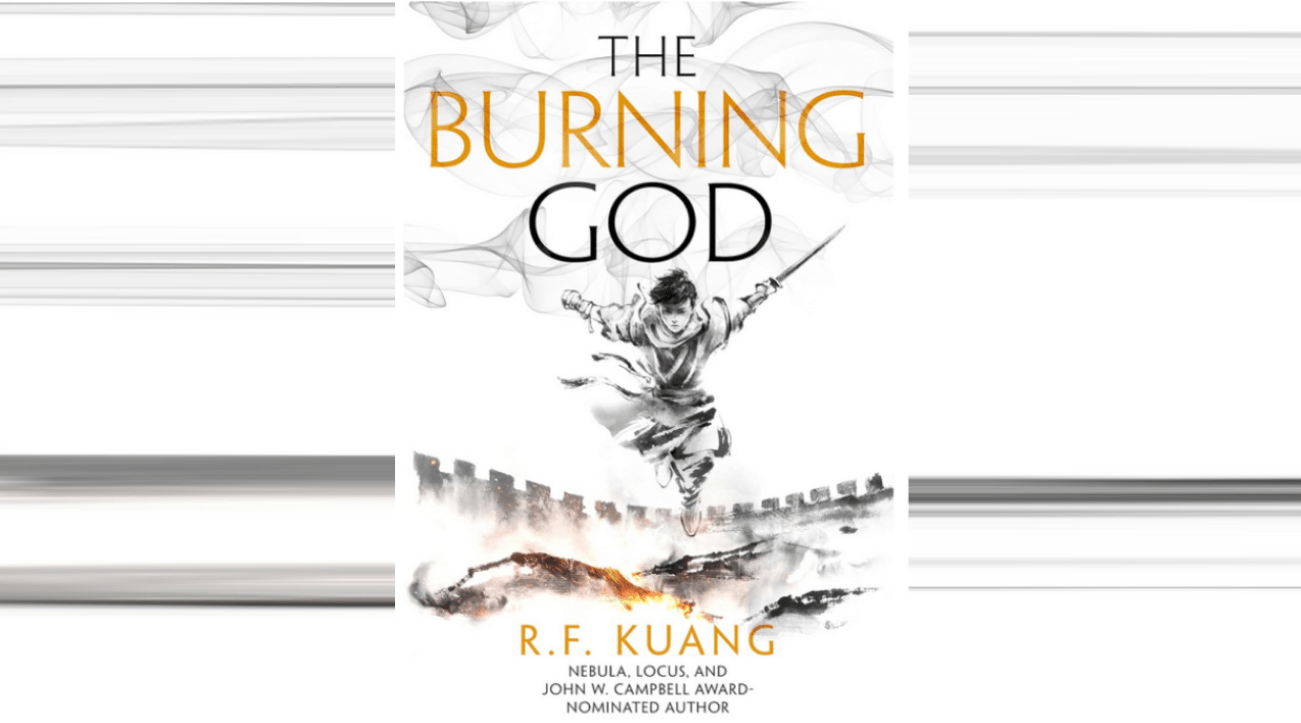Sneha Jaiswal (Twitter | Instagram)
‘The Burning God’ might be the best of the ‘Poppy War Trilogy’ by RF Kuang, who displays rare courage as an author and finally falls out of love with her protagonist. And I have hated Rin since the second-half of the first book in the series. She is an unbearable whiny genocidal megalomaniac. But RF Kuang is a fantastic storyteller and I re-calibrated my expectations at the very beginning of this book, telling myself: this is a villain’s story.
“She is a God, She is a Monster” – R.F. Kuang uses these very words, spoken by another character in ‘The Burning God’, to describe Rin. And a monster she is.
In case you don’t remember how ‘The Dragon Republic’ (The Poppy War #2) ended: Rin helps the Dragon Warlord Vaisra lead a grueling, drawn-out, blood-soaked but ultimately successful rebellion against the Empress in the north of Nikara, only to be thrown into prison. She is betrayed by Vaisra’s son Yin Nezha so that their allies, the Hesperians, can perform experiments on her to study her shamanic powers. Best friend Kitay, who has also become her anchor (after a ritual binds them and allows Rin to channel the Phoenix without losing her shit), rescues her by cutting off her hand. ‘The Burning God’ thus follows the duo’s mission to unite the south of Nikara to defeat Vaisra and Nezha.
This third book by RF Kuang suffers from the same flaws I complained about in the review for ‘The Dragon Republic’: a lack of character development for the supporting faces in the tale. Almost EVERYBODY in ‘The Burning God’ is more interesting than Rin, the one-dimensional protagonist, whose default setting is ‘I am so angry, I want to burn the world’. While her best-friend Kitay and master Jiang obviously have vastly better personalities… even Su Daji, the empress of Nikara, the evil shaman who betrays her best-friends to grab power, then sacrifices half her kingdom to hold on to power, is more captivating. Hell, even the bratty Nezha, who can control water, and is tortured by a dragon, emerges as a worthier rival.
That said, RF Kuang’s writing shines best in showing the ravages of war… the deaths, disease, despair, horrors that follow. In Book 2, Rin was largely incapacitated by Daji’s poison, unable to wield the fire, but ‘In The Burning God’, she gets a free rein, helping her conquer south of Nikara with relative ease. Some interesting new characters and war generals are introduced, the most intriguing being Yang Souji, a rebel leader in the South with expertise in guerilla warfare.
One of the best things in the third book was that the legendary ‘Trifecta’ (Su Daji, Jiang, and Riga) finally get their backstory. Again, they deserved a lot more space in the tale. The author hypes up the Trifecta incredibly, especially Riga, who was the Dragon emperor of Nikan, before Su Daji took over the reins, but their stories end on a frustratingly disappointing note. It’s like waiting to watch fireworks and then getting to see only a handful of floating lanterns.
Rin goes completely off her rocker towards the end ‘The Burning God’, which of course was expected, since shamans and insanity are supposed to go hand in hand. There’s lots of repetitive shit in the book, mostly about her wanting to incinerate everything. Kuang tries to redeem Rin a few times by making it seem like she might have a conscience, and those moments are laughable. Readers have to reconcile with the fact that Rin is a power-hungry, genocidal maniac. Any indication otherwise, is only pretense.
But well, despite all the frustrations you experience as a reader while reading ‘The Burning God’, R.F. Kuang sustains steady suspense and excitement until the end. Half of Nikara is burnt, starving, impoverished by the last few chapters, and Rin is faced with old foes, spies, and new betrayals. There are only a limited ways a war story like this can end, and luckily for me, it ended just how I wanted it to!
And that’s why, I am going with 4 stars on 5 for ‘The Burning God’.
Read Next: Lord of Mysteries Review: Beyonders & a ‘Beyond-My-Brain’ Pace (Audio Version Below)

